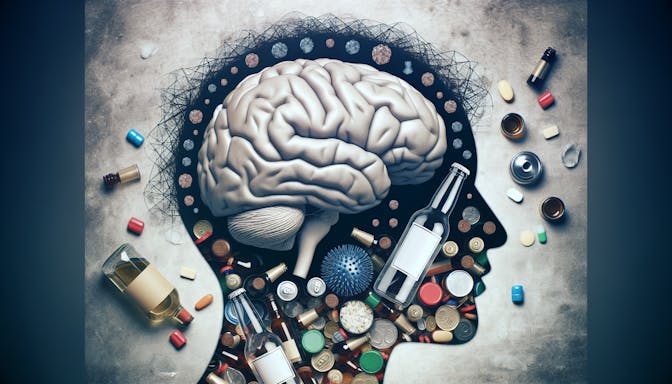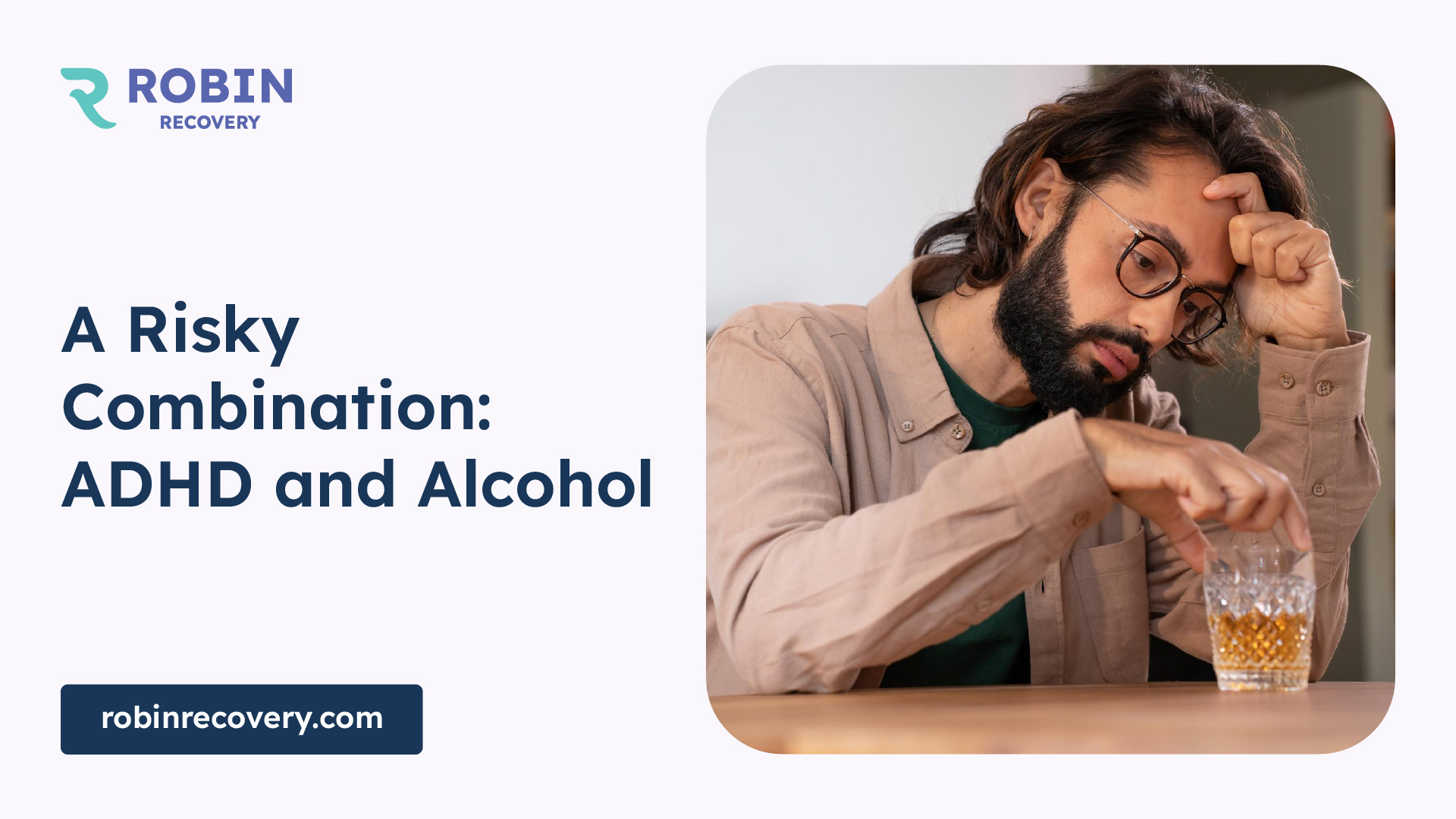A Risky Combination: ADHD and Alcohol

Understanding Alcohol Addiction and ADHD
Understanding the interplay between ADHD and alcohol addiction is vital in formulating effective treatment strategies. ADHD, a disorder characterized by chronic inattention and/or hyperactivity, affects the ability to focus on tasks at hand. Meanwhile, alcohol is a depressant that affects the same region of the brain, the prefrontal cortex, which is responsible for executive functions. This shared neural impact area forms a crucial link that connects ADHD and alcohol addiction.

Link Between ADHD and Alcohol Addiction
ADHD and alcohol indeed share a dangerous connection. According to the Alcohol Rehab Guide, when the prefrontal cortex of an ADHD sufferer is impaired by alcohol, it can lead to uncontrollable behaviors and emotions. This effect is even more pronounced given that scans have shown a smaller prefrontal cortex in patients with ADHD.
Consequently, people afflicted with ADHD are more likely to develop alcohol use disorder. The debilitating cocktail of ADHD and alcohol tends to make the symptoms of each condition worse, and vice versa. Notably, alcoholism seems to develop more rapidly in individuals with ADHD and becomes apparent at younger ages.
Prevalence of Alcohol Abuse in ADHD
Alcohol abuse statistics in ADHD individuals paint a concerning picture. Approximately 40% of patients with substance use disorders also screen positive for an ADHD diagnosis. About 25% of adults being treated for alcohol and substance use disorders are diagnosed with ADHD [2].
The prevalence of alcohol abuse or dependence among young adults with ADHD is as high as 44%, compared to 27% for young adults without ADHD [3].
The presence of ADHD in individuals, therefore, indicates a higher likelihood of alcohol abuse and dependence. These findings underscore the importance of early diagnosis and intervention in managing both ADHD and alcohol use disorder.
Understanding ADHD and alcohol addiction is just the first step. It's crucial to delve into the factors contributing to this co-occurrence and to understand the unique risks and vulnerabilities ADHD individuals face. Only then can we formulate effective treatment approaches and long-term management strategies.
Factors Contributing to Alcohol Addiction in ADHD
Several factors contribute to the increased risk of alcohol addiction in individuals with ADHD. Two notable factors are insomnia and impulsivity, which are commonly seen in ADHD patients.
Insomnia and Alcohol Consumption
Insomnia is common among the general population, with a prevalence of around 30%. However, adults with ADHD experience a significantly higher risk of insomnia, with up to a fivefold increase compared to population controls of a similar age.
The presence of insomnia in adults with ADHD further contributes to a higher quantity of alcohol consumption. This increased alcohol consumption is a significant risk factor for worsening ADHD symptoms. In fact, the severity of alcohol consumption is higher in adults with ADHD, and consumption quantity is a stronger risk factor for ADHD symptoms in adults with ADHD compared to the frequency of drinking behavior [1].
Impulsivity and Behavior Problems
Another factor contributing to alcohol addiction in individuals with ADHD is associated with the core symptoms of this disorder - impulsivity and behavior problems. ADHD is characterized by a high prevalence of anxiety and depression, which can further increase the risk of negative functional outcomes.
Around 40% of patients with substance use disorders (SUDs) also screen positive for an ADHD diagnosis. This underscores the strong link between ADHD, alcohol addiction, and other substance use disorders, and highlights the need for comprehensive interventions that address both the substance use and the underlying ADHD symptoms [1].
Understanding these factors can help in the development of more effective treatments for individuals with ADHD who are struggling with alcohol addiction. Managing these contributing factors may reduce the severity of both ADHD symptoms and alcohol addiction, leading to improved outcomes.
Risks and Vulnerabilities in ADHD Individuals
ADHD, or Attention Deficit Hyperactivity Disorder, is a condition characterized by symptoms such as impulsivity, hyperactivity, and inattention. When coupled with alcohol use, individuals with ADHD can face unique risks and vulnerabilities.
Vulnerability to Alcohol-Induced Impairments
One of the key risks associated with the combination of ADHD and alcohol is an increased vulnerability to alcohol-induced impairments. In a study cited by PubMed Central, it was found that adults with ADHD displayed significant alcohol impairment regardless of cue condition, suggesting a heightened sensitivity to alcohol-impairment of inhibitory control.
The study utilized a cued go/no-go task to measure inhibitory control. The results demonstrated that alcohol dose-dependently increased inhibitory failures in controls in the invalid cue condition. However, those with ADHD displayed significant alcohol impairment regardless of cue condition, indicating an increased sensitivity to alcohol-impairment of inhibitory control.
Sensitivity to Disinhibiting Effects
The same study also found that individuals with ADHD are more sensitive to the disinhibiting effects of alcohol. This implies that alcohol significantly impaired inhibitory control in individuals with ADHD, regardless of cue condition, whereas controls showed impairments only in the invalid cue condition.
The findings highlight the vulnerability of inhibitory mechanisms versus activational mechanisms of behavioral control. Inhibitory control is particularly vulnerable to the disruptive effects of alcohol in individuals with poor inhibitory control, such as those with ADHD. This vulnerability might be especially pronounced in environmental situations that normally afford protection against the disinhibiting effects of alcohol.
The results further suggest that individuals with ADHD have an increased sensitivity to the acute disinhibiting effects of alcohol, which may contribute to the high incidence of impulsive behaviors observed in this population, especially when intoxicated. Future research is needed to examine the potential behavioral consequences of this increased sensitivity to alcohol in adults with ADHD.
These findings underscore the need for increased awareness and understanding of the specific risks and vulnerabilities associated with ADHD and alcohol misuse. This knowledge is crucial for the development of effective prevention and treatment strategies, and for supporting those who are navigating the challenges of ADHD and alcohol addiction.
Treatment Approaches for ADHD and Alcohol Addiction
Treating individuals with both ADHD and alcohol addiction can be challenging due to the complex interactions between these conditions. However, a combination of medication and psychotherapeutic interventions can be effective in managing these co-occurring disorders.
Medication Considerations
Pharmacotherapy remains the mainstay of treatment for ADHD. Psychostimulants, such as methylphenidate and amphetamine analogs, are the most commonly used medications to treat ADHD. However, many clinicians are reluctant to prescribe stimulants to patients with substance use disorders (SUD) due to the potential for abuse.
The decision to use stimulant pharmacotherapy in a patient with ADHD and co-occurring SUD requires an individualized risk-benefit assessment. Factors such as ongoing substance use, prior history of misuse of stimulant medication, other co-occurring psychiatric disorders, and overall clinical stability should be taken into account.
Psychotherapeutic Interventions
In addition to medication, psychotherapeutic interventions play a crucial role in the treatment of ADHD and alcohol addiction. These interventions can help individuals manage their symptoms, improve coping mechanisms, and reduce alcohol consumption.
Psychotherapeutic interventions can include cognitive-behavioral therapy (CBT), motivational interviewing (MI), or family therapy. CBT focuses on helping individuals develop effective strategies for managing their ADHD symptoms and reducing their alcohol consumption. MI, on the other hand, is designed to enhance an individual's motivation to change their drinking behavior. Family therapy can be beneficial in cases where family dynamics contribute to the individual's alcohol misuse and ADHD symptoms.
Psychotherapy can be delivered in an individual or group setting. The choice of setting depends on the individual's preferences, the severity of their symptoms, and the availability of resources.
In conclusion, a combination of medication and psychotherapeutic interventions can be effective in treating individuals with ADHD and alcohol addiction. It's important to remember that treatment should be individualized and adjusted as needed to ensure the best possible outcome for each individual.
Long-Term Implications of ADHD and Alcoholism
The co-occurrence of ADHD and alcoholism can have long-term implications, affecting both the onset of substance abuse and the challenges faced during remission.
Early Onset of Substance Abuse
Individuals with ADHD typically start experiencing problems with drugs and alcohol at an earlier age compared to those without the condition. Research has shown that children with ADHD are more likely to begin using alcohol at a younger age compared to their peers without an ADHD diagnosis. This early onset of alcohol use serves as a predictor of alcohol and substance abuse in adulthood [3].
In fact, teens with ADHD may be drawn to drinking due to seeking pleasurable sensations from alcohol. Those with ADHD may use the neurotransmitter dopamine faster than those without ADHD [5]. Furthermore, teens with ADHD who drink regularly are at a higher risk of developing alcoholism, especially if they are also taking ADHD medications like Ritalin or Adderall. Research indicates that 1 in 3 young adults with ADHD develop alcohol use disorder, compared to 19% of those without ADHD.
Challenges in Remission
The path to remission for individuals struggling with ADHD and alcoholism can also be fraught with challenges. A study found that individuals with ADHD exhibited a deficit in inhibitory control compared to healthy controls. This deficit was exacerbated in response to alcohol, suggesting an increased sensitivity to alcohol-impairment of inhibitory control in adults with ADHD [6].
Moreover, individuals with substance use disorders and ADHD have an earlier onset of substance abuse than those without ADHD. They also have a greater likelihood of having continuous problems if they develop substance dependence. They also have a reduced likelihood of going into remission, and a tendency to take longer to reach remission [4].
In conclusion, understanding the long-term implications of ADHD and alcoholism is crucial for developing effective treatment strategies. It also underscores the importance of early intervention and tailored support for individuals with ADHD who are at risk of developing alcohol use disorders.
Managing ADHD and Alcohol Use
The management of ADHD and alcohol use is a complex task that requires a comprehensive and individualized approach. The key aspects that need to be considered include an individualized risk-benefit assessment and the presence of co-occurring psychiatric disorders.
Individualized Risk-Benefit Assessment
When treating a patient with ADHD and co-occurring substance use disorder (SUD), an individualized risk-benefit assessment is crucial. Factors such as ongoing substance use, previous misuse of stimulant medication, other co-occurring psychiatric disorders, and overall clinical stability should be taken into account [4].
Psychostimulants, such as methylphenidate and amphetamine analogs, remain the most commonly used medications for treating ADHD. However, due to their potential for misuse, many clinicians are hesitant to prescribe these stimulants to patients with substance use disorders.
Therefore, it's essential that these factors are carefully evaluated in order to make the best decision for the patient's overall health and well-being. The goal should always be to maximize benefits while minimizing potential risks.
Co-Occurring Psychiatric Disorders
Attention-deficit hyperactivity disorder (ADHD) often co-occurs with other mental disorders in patients with substance use disorders (SUD). This can add another layer of complexity to the treatment process [4].
Individuals with substance use disorders and ADHD tend to have an earlier onset of substance abuse than those without ADHD. They are more likely to have continuous problems if they develop substance dependence, less likely to go into remission, and generally take longer to reach remission.
Additionally, people with ADHD appear to be more vulnerable to the disinhibiting effects of alcohol, which can further exacerbate their condition.
Hence, when managing ADHD and alcohol use, it's critical to consider co-occurring psychiatric disorders. An integrated approach that addresses all the patient's mental health needs can lead to more effective treatment outcomes.
While pharmacotherapy remains the mainstay of treatment for ADHD, complementary psychotherapeutic approaches also play a critical role in managing both ADHD and co-occurring psychiatric disorders. Therefore, a comprehensive treatment plan should consider all these aspects to effectively manage ADHD and alcohol use.
References
[1]: https://www.ncbi.nlm.nih.gov/pmc/articles/PMC7269111/
[2]: https://www.alcoholrehabguide.org/resources/dual-diagnosis/alcohol-and-adhd/
[4]: https://www.ncbi.nlm.nih.gov/pmc/articles/PMC2676785/
